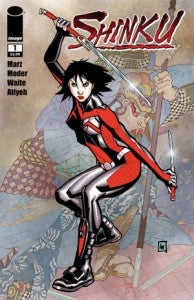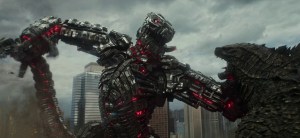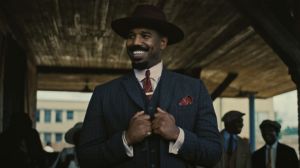, the new, creator-owned comic from Ron Marz and Lee Moder, hit comic shops today and…well, it’s one of the best new #1’s I’ve read in a while. Badass, original and NOT for the feint of heart, I’ve fallen for this book very quickly and, along with Moriarty and Morning Glories, it’s one of a handful of new titles that have made me an “Image Guy” for the first time in my life. Combine those with perennial successes likeSavage Dragon and The Walking Dead (plus Chew and the upcoming return of Todd Dezago and Craig Rousseau’s The Perhapanauts) and you’d be hard-pressed to find a mainstream publisher releasing a greater quantity of truly impressive monthly books. Hopefully I’ll get Daniel Corey, Nick Spencer and Robert Kirkman to talk to us one day soon, but one thing’s for sure: As long as the title is on the shelves and he’s willing, I’ll be happy to host Ron Marz providing creator’s commentary on Shinku.The basic premise, for those of you in the dark, is that Shinku is a Japanese woman who is the last in a long line of samurai fighting against another clan of samurai-who also happen to be vampires. As a result, they’ve managed to outlast her clan and it’s down to her versus an entire dark society of vampires with only a disgraced sumo wrestler and a hapless American office worker at her side. For anything more than that, you’ll have to read the first issue-then come back here to get a little more of the nitty-gritty on it from co-creator and writer Ron Marz.
Videos by ComicBook.com
On influences: What are some of your favorite creator-owned books? And don’t just name off all the Image books, because that’s not only cheating but it also seems a little easy given your home base.Ron Marz: I’m pretty religious about reading all of Mignola’s “Hellboy” universe stuff, especially Hellboy itself, which is one of my favorite books. I also check out “The Walking Dead,” “Invincible,” “Skullkickers,” “Brubaker’s,” “Criminal” and “Incognito,” the creator-owned stuff that Millar and Bendis are doing.RB: …And some of the movies you’d recommend to the Shinku audience?RM: Obviously you start with Kurosawa. There’s also enough modern samurai stuff, like “13 Assassins,” that you can pick and choose. I also draw a lot of inspiration from Chinese films like “Hero” and “Red Cliff.”RB: Clarify something for me: Is Shinku herself a vampire? There’s no indication of that in the first issue but I seem to remember reading something in an interview that seemed to suggest she was.RM: No, Shinku is absolutely human. To me, one of the primary factors is that Shinku is terribly outnumbered by these vampires. It’s almost “I Am Legend” taking place right in the middle of modern society, in that you have a lone warrior taking on a legion of vampires.RB: There’s clearly a kind of “society” going on in the last few pages. How would you paint the relationship the vampires have to one another? I mean, there’s a very specific way of dealing with the community in something like the Sookie Stackhouse books, whereas in most other media vampires have been painted as either lone wolves or traveling in packs.RM: Because we’re dealing with a clan of vampires that have existed since the classical samurai period, that’s the structure they adhere to. It’s very much a feudal structure with the leader of the clan calling the shots, though in this case the same leader has been in place for hundreds of years. I think the closest example that’s a little more familiar is the structure of an organized crime family, with a don and his capos at the top of the family.RB: There’s something vaguely Sisyphean about a war between a group of mortals and a group of immortals. Do you plan to look into the roots of how this particular conflict came to be the defining element for Shinku’s clan?RM: Yeah, we’ll definitely do flashbacks to the beginning of this whole war, how it came to be. The story is mostly set in modern Japan, but just like a lot of Japanese society, its roots go back hundreds of years.RB: You’ve been percolating this story for ten years, but because of it coming out now, every interview seems to want to counterpoint you with Twilight. Is that frustrating, or do you think it’s good because it gives you kind of a mainstream hook to get some eyes on the book that might not otherwise have found it?RM: No, it’s not frustrating, that’s just the way it works. For good or ill, the zeitgeist for vampires the last few years has been “Twilight.” I think it’s pretty obvious this is not a “Twilight”-style story. If the media shorthand for “Shinku” casts it as the anti-“Twilight,” that’s fine.RB: With Witchblade and Magdalena and Shinku, it’s easy to make the connection that you’re writing a lot of strong, female action leads (and everyone already has). Does it say something about the simplistic and transient nature of media criticism that you’ve gone from “the refrigerator guy” to “Terry Moore for the action-hero set” without making a conscious effort to be either?RM: Sure, everything is boiled down to the lowest common denominator by most media. Everybody is interested in bite-sized nuggets, nobody wants to sample the whole entree. And, really, people see what they want to see anyway. I’m sure there are people who remain convinced I’m a horrible misogynist, and there are people who think I’m the standard bearer for the “strong female character,” neither of which is true. I just try to write characters that feel like real people to me, male or female.RB: That said, Shinku is a character you’ve described as being not-cuddly. Having a female lead who is physically intimidating and emotionally stunted is really non-standard. Are you setting up for that to be an area for her to potentially grow in the long run?RM: I think you always want to leave room for your characters to grow in some way, because otherwise what’s the point? But I don’t know that I’d call Shinku emotionally stunted. She might be, I’m still figuring her out. But at the moment, I tend to think of her more as emotionally guarded, extremely so.RB: All that said, what went into the decision to make your primary samurai character a female? I can’t remember anyone doing that before.RM: Mostly, it was just a desire to play against type, to do something that was a little more unexpected than the cliche male action hero. Plus, I think placing a woman in opposition to this male-dominated vampire hierarchy adds another wrinkle to the story.RB: Was it important to you that, for an audience made up primarily of American males (as comics is), you had a point-of-view character who fit that description? I mean, Davis is very different from anyone else we see in the first issue but for the most part he seems the most relatable.RM: It was more important to me that we had a way into the story through a Westerner. The samurai society in particular and Japanese society as a whole can be really foreign, in every sense of the word, to a Western audience. Davis ended up being a male simply to draw more of a contrast to Shinku, and maybe set up some sexual tension. I also like the dynamic of the woman being the ass-kicker, and the male being the brainy one.RB: That said, even as the sane, relatable guy who’s a stranger in a strange land, he accepts pretty quickly that the chick he was just making out with, was a vampire. And goes off with her killer. Does that say something about his character or was it just kind of a story necessity?RM: That moment in issue #1, when Davis has to decide whether he trusts Shinku or not, is essentially him jumping into the deep end of the pool. It’s essentially that Terminator moment when Schwarzenegger says, “Come with me if you want to live.” It’s a split-second decision that turns out to be a life and death choice. I suppose it does say something about his character that he made, apparently, the right choice when it mattered the most.RB: The other thing that occurs to me: Is Davis a permanent cast member? I couldn’t tell by the dialogue on the first page whether he was in Japan permanently or only temporarily for his job.RM: Yes, he’s a permanent cast member, at least as long as he survives. He’s not just window dressing serving as a point of entry into the story for readers. Davis actually is a huge part of the story going forward, but readers won’t find out why until issue #3.RB: You’ve said in previous interviews that it’ll become clear soon that he was saved for a reason. Without spoiling anything, is it then pretty safe to assume that he was targeted for a reason?RM: It’s safe to assume that, but I’m not going to tell you why just yet.RB: I can’t help but notice that the two “Ron Marz Everyman Characters”© that spring immediately to mind for me (Davis and Kyle Rayner of Green Lantern) both get their start in a back alley behind a nightclub. Is this someplace you’ve spent a lot of time in your life?RM: Actually, no, I’m not a nightclub guy. I’d much rather perch on a stool in a dark Irish pub. Truthfully, I never even made that connection until you just mentioned it.RB: Seriously, though-Davis being the POV character puts him in kind of a weird light. He’s not the Main Character but he’s someone we want to know and relate to. How much of his life pre-Shinku will play into the book (like, will we see his friend from the bar again?) and how much will he be rolled into Shinku’s supporting cast?RM: His friend, Reizo will be seen again in issue #3. Davis is very much a member of the cast, and so is Oshima, the sumo who serves as Shinku’s support.RB: When you get into horror, I think there’s a tendancy to be constantly looking over your shoulder. Some of the psychological fallout from living in that world is what makes The Walking Dead great. Will we see some of that from a character like Davis? I mean, if I were him I’d be questioning his buddy who literally pointed to Hideko and said, “Go get ‘er!”RM: Davis is literally being introduced to an entire world he didn’t know existed, and introduced in a fairly extreme manner. There’s definitely going to be an adjustment for him to get his head screwed on straight again. Davis was a stranger in a strange land to begin with, now he’s a stranger entering a much stranger land.RB: And, man-this is a mature readers book, isn’t it? We don’t make it past the five-page preview window before there’s breasts, and that is far and away the least racy or insane thing we’ll see in the first issue. Was it your intent to bring this out of the typical domain of horror comics and take on a lot of the properties of vampire and horror stories from other media?RM: For me, the vampire myth has always been equal parts sex and violence. I didn’t see any reason to soft-pedal either aspect, so we made the decision to do a mature readers title. I’m not at all interested in gore, really. Films like the “Saw” series and all the rest of that torture-porn crap do nothing for me, because they don’t offer much in terms of imagination. We wanted the violence in the first issue of “Shinku” to be over the top in order to reflect the shock of Davis being exposed to this hidden world. Yes, there’s going to be blood, it’s a vampire story. There’s a fight scene in an elevator in issue #2 that’s quite bloody. But I think we’re using the violence effectively, not excessively.RB: Even in the context of being very violent and very sexy, we have Shinku herself presented as completely in shadows when Davis barges in on her naked. I think that’s a moment that can really influence perceptions of the character. Was that a writing choice or did that come from Lee?RM: That was definitely a writing choice, but again, people will see what they want to see. What someone takes away from a scene like that ultimately depends on what they bring to a scene like that.RB: What made you think of Moder for this title? As you’ve pointed out elsewhere, your previous collaboration was an all-ages book and his style looks great in Shinku but wouldn’t necessarily have been something I pictured in my head as ideally suited to this type of story.RM: In addition to being one of my good friends, Lee a guy who can draw anything, the whole spectrum from kid stuff, to traditional superheroes, to bloody, sexy horror. That’s one of the beauties of doing a creator-owned book, you get to work with your friends.RB: Was the kind of hazy, sepia quality of the flashbacks something that you scripted, or how did that come about?RM: That was completely a choice by Mike Atiyeh, our colorist and also one of my good friends for years. Mike wanted to take those flashback pages in that direction, and the reaction has been really positive. One of the overall color motifs we wanted to present in the book is having all the blood be very primary and flat, so it really pops from the rest of the palette. Mike adapted that to the sepia pages, and I think it really gives that sequence an interesting look.RB: You’ve described Asano elsewhere as being a fairly level-headed and honorable villain, and likened him to an organized crime boss. That certainly jives with his comments on Hideko, but if that’s what he thinks of his underlings, what’re the odds that he’ll have more serious problems with them in the long run?RM: Well, Asano first has to assure that there is a “long run” for his clan. His primary responsibility is to finally destroy Shinku. Why he hasn’t done so up to this point is something we get into a little bit in issue #3. Beyond that, I think he faces the same dilemma that any elder generation faces from a younger generation. The younger generation is less inclined to cling to tradition, even if tradition is the basis of their whole way of life.










